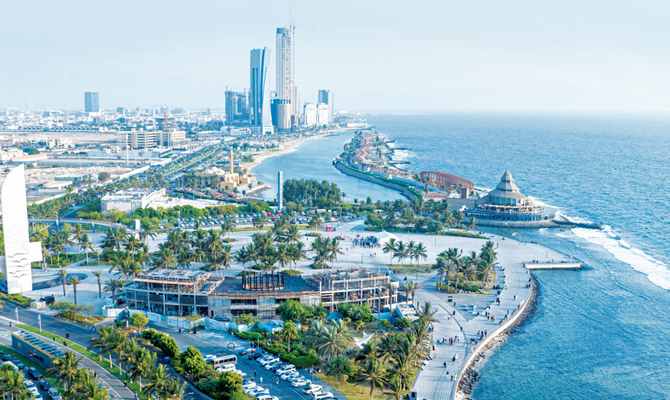Saudi Arabia’s Industry 4.0 initiative drives economic diversification

Saudi Arabia has embarked on an ambitious journey to embrace the Fourth Industrial Revolution, commonly associated with the period around the late 2000s to the early 2010s.
Recognizing its transformative potential for economic diversification and societal advancement, the nation unveiled its ambitious Vision 2030 plan on April 25, 2016, highlighting the strategic National Industrial Development and Logistics Program, or NIDLP.
This initiative aims to cultivate high-growth sectors domestically and foster an open economy receptive to foreign capital infusion. Additionally, it serves as a catalyst for integrating Industry 4.0 technologies across diverse sectors.
Speaking to Arab News, Harsh Kumar, chief strategy officer and co-founder of Shipsy — a software platform that helps logistics companies and shippers manage their cargoes —explained that Saudi Arabia is well-positioned to become a regional hub for Industry 4.0. The Kingdom leverages its abundant energy resources for cost-effective, energy-dependent production and its strategic geographic location as a crossroads for Asia, Europe, and Africa to develop advanced supply chain infrastructure.
From investments in the tech sector to fostering an innovation ecosystem, the Kingdom has laid the groundwork for a thriving knowledge-based economy poised for the challenges and opportunities of the digital age.
As a G20 member, Saudi Arabia actively fosters a progressive environment to nurture entrepreneurship and drive technological advancement.
The establishment of innovation hubs, startup accelerators, and research institutions creates fertile ground for collaboration and creativity. Initiatives like the Saudi Venture Capital Co., the King Abdullah University of Science and Technology, and the King Abdulaziz City for Science and Technology are fueling the development of cutting-edge applications.
By fostering a culture of innovation and entrepreneurship, Saudi Arabia empowers its youth and workforce to harness the opportunities presented by the Fourth Industrial Revolution and contribute to its economic prosperity.
Kumar added that Saudi Arabia can adopt smart manufacturing and supply chain technologies such as AI, predictive intelligence, automation, as well as IoT, and robotics to enhance efficiency and capitalize on growing domestic demand.
“A supportive policy framework offering incentives, investment in education to cultivate a skilled workforce, and fostering research and development through partnerships with global tech leaders will be crucial,” Kumar said.
He further noted that international collaborations could import best practices and tailor innovative solutions, setting Saudi Arabia as a leader in the region’s technological transformation and supply chain excellence.
Assessing the current level of digitalization and technological maturity within Saudi Arabia’s industrial sector, Kumar noted that, according to tech giant Ericsson, the Kingdom has an impressive 98 percent internet penetration among its over 32 million people.
“The nation is on the cusp of significant transformation. Then, initiatives like the Digital Government Authority and Vision 2030 will fuel smart city projects, enhance digital healthcare, upgrade infrastructure, and help roll out autonomous supply chain technologies,” Kumar said.
He added that the e-commerce sector is expected to exceed $13 billion by 2025, introducing immense opportunities to enhance end-to-end warehouse and delivery operations using AI.
“Furthermore, the government has initiated a $1.2 billion program to boost the digital capabilities of 100,000 students by 2030,” he said. Highlighting the specific subsectors within the Saudi industrial landscape leading the adoption of Industry 4.0 technologies, Kumar emphasized that robust and resilient supply chain and logistics networks are critical across manufacturing, trade, retail, and other industries.
He explained that a nation’s gross domestic product is directly linked to its supply chain performance. Therefore, it is unsurprising that the supply chain industry is expected to embrace advanced technologies like AI, machine learning, as well as IoT, automation, and analytics, along with predictive intelligence and blockchain.
These technologies are anticipated to reduce costs, drive sustainability, improve customer service, balance demand and supply, control prices of everyday items like groceries, vegetables, and meat, and ultimately enhance Saudi Arabia’s global competitiveness.
The second edition of the Global Machinery & Equipment Report 2024, released by Bain & Co., reveals significant opportunities for machinery and equipment manufacturers worldwide.
The study indicates that these manufacturers can achieve immediate and substantial improvements in productivity, with potential gains ranging from 30 to 50 percent.
This transformation can be accomplished by leveraging AI, lean methodologies, digital advancements, and sustainability innovations, essential components of the envisioned “Factory of the Future.”
The same report added that many machinery executives increasingly consider AI adoption urgent. According to Bain’s research, 75 percent of executives from the broader advanced manufacturing industry said that adopting emerging technologies such as AI is their top priority in engineering, research, and development.
Discussing the future path of Saudi Arabia’s industrial sector in the era of Industry 4.0 and the key opportunities, challenges, and uncertainties ahead on this transformative journey, Kumar stated that the Kingdom’s industrial sector is set to evolve through the digitalization and automation of supply chain operations, enhancing efficiency and fostering innovation.
)
)
)
)